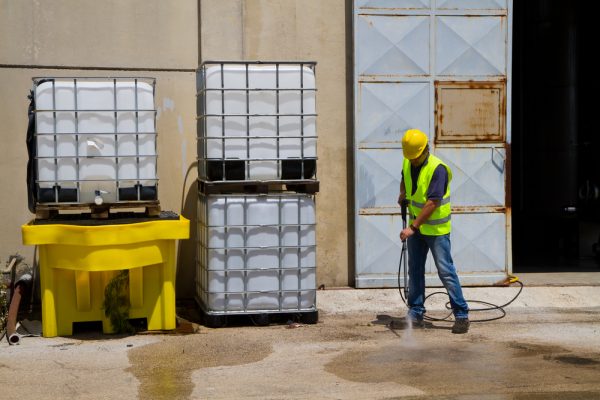Pressure Cleaning Safety: What Miami Homeowners and Businesses Need to Know

Pressure cleaning is an essential maintenance task for homeowners and businesses in Miami, helping to keep properties clean, attractive, and well-maintained in the face of the city’s humid climate and occasional tropical storms. However, while pressure cleaning can be highly effective, it also comes with potential safety risks that users must be aware of. In this article, we’ll discuss the key safety considerations for pressure cleaning and what Miami residents and business owners need to know to protect themselves, their properties, and the environment.
Understanding Pressure Cleaning Equipment
Pressure washers come in two main types: electric and gas-powered. Electric pressure washers are generally more compact and quieter, making them suitable for smaller properties and lighter-duty tasks. Gas-powered pressure washers, on the other hand, offer higher pressure levels and are more mobile, making them ideal for larger properties and tougher cleaning jobs.
Regardless of the type, all pressure washers have several key components:
- Pump: Generates the high-pressure water stream
- Hose: Carries water from the pump to the cleaning surface
- Nozzle: Determines the water stream’s pressure and angle
- Detergent injector: Mixes cleaning chemicals into the water stream
It’s crucial to understand the appropriate pressure levels for different surfaces to avoid causing damage. For example, while concrete can withstand high pressure, more delicate surfaces like wood or painted surfaces require lower pressure settings.
Risks Associated with Pressure Cleaning
Pressure cleaning can pose several safety risks, including:
- Physical injuries from the high-pressure water stream
- Cuts, lacerations, and bruises
- Eye and ear damage from flying debris or the water stream itself
- Electrical hazards when using electric pressure washers
- Risk of electric shock if the equipment is not properly grounded or maintained
- Slip and fall accidents on wet surfaces
- Pressure cleaning can create slippery conditions on walkways, driveways, and other surfaces
- Inhalation of cleaning chemicals and fumes
- Some cleaning solutions contain harsh chemicals that can be harmful if inhaled
Personal Protective Equipment (PPE) for Pressure Cleaning
To minimize the risk of injuries, it’s essential to wear appropriate PPE when pressure cleaning. Key PPE items include:
- Safety glasses or goggles to protect the eyes from flying debris and water
- Ear protection, such as earplugs or earmuffs, to guard against noise from the pressure washer
- Gloves (rubber or leather) to protect hands from chemicals and abrasions
- Non-slip shoes or boots to prevent slips and falls on wet surfaces
- Long pants and long-sleeved shirts to shield the skin from the water stream and debris
Safe Operating Procedures
To ensure a safe and effective pressure cleaning experience, follow these best practices:
- Read and follow the manufacturer’s instructions for your specific pressure washer model
- Inspect your equipment before each use, checking for leaks, damage, or wear
- Ensure proper grounding and electrical safety, especially when using electric pressure washers
- Adjust pressure and nozzle settings according to the surface you’re cleaning
- Maintain a safe distance from the cleaning surface to avoid damage and injuries
- Avoid contact with electrical components and wiring to prevent electric shock
- Properly handle and store cleaning chemicals to minimize exposure and prevent accidents
Environmental Considerations
In addition to personal safety, it’s important to consider the environmental impact of pressure cleaning. Key points to keep in mind include:
- Preventing runoff and overspray from contaminating nearby water sources, such as storm drains or bodies of water
- Properly disposing of cleaning solutions and wastewater in accordance with local regulations
- Complying with any local guidelines or restrictions on pressure cleaning to minimize environmental harm
When to Hire a Professional Pressure Cleaning Service
While DIY pressure cleaning can be satisfying, there are situations where it’s best to leave the job to professionals:
- Complex or high-risk cleaning projects that require specialized equipment or expertise
- If you lack experience or comfort with pressure cleaning equipment
- To save time and effort, especially for larger properties or time-sensitive cleaning needs
- To ensure compliance with safety and environmental regulations
Professional pressure cleaning services have the knowledge, experience, and equipment to handle even the toughest cleaning challenges while prioritizing safety and environmental responsibility.
Final Thoughts
Pressure cleaning is a powerful tool for maintaining the appearance and integrity of properties in Miami, but it’s crucial to prioritize safety when using this equipment. By understanding the risks, wearing appropriate PPE, following safe operating procedures, and considering environmental impacts, homeowners and businesses can enjoy the benefits of pressure cleaning while minimizing potential hazards.
Remember, if you’re ever unsure about your ability to safely tackle a pressure cleaning project, don’t hesitate to reach out to us for professional service. With the right knowledge and precautions, pressure cleaning can be a safe and effective way to keep your Miami property looking its best.

